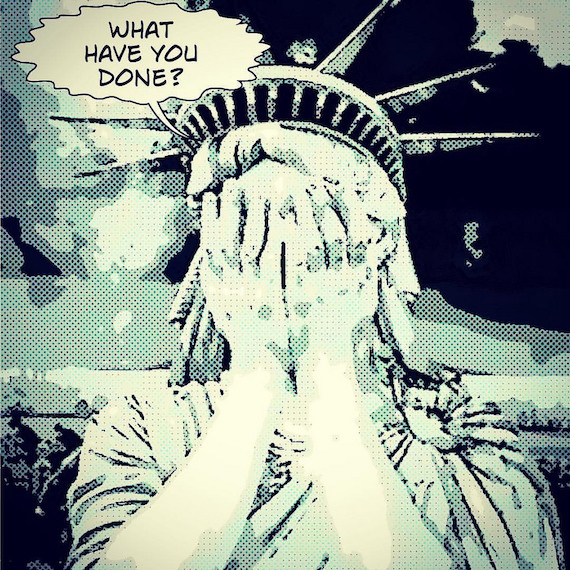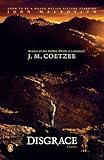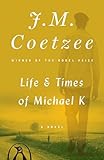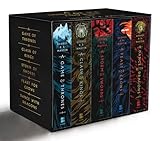
With campaign rhetoric thrumming and throbbing around us, along with deepening divisions around race, guns, sexuality, and national security; and since much of what we see/hear in the media is alarming, disappointing, and not infrequently inane; I thought we might offer up some alternatives for readers looking to sink their political minds into something intelligent, compelling, possibly even hopeful (if not exactly optimistic). I asked Millions staff writers:
What is/are the best political fiction(s) you’ve read in the past decade?
We’re focusing on fiction because we’re interested in a broad definition of “political.” I wanted to hear from my colleagues what even constitutes “political fiction” in their minds.
 The novel that came to mind for me first was J.M. Coetzee’s Disgrace I read it when it was published 16 years ago, but its chilling notion of social justice has stayed with me: in post-apartheid South Africa, Lucy, a white woman, is gang-raped in her home by three black men. She learns that the men are known by (one is even related to) Petrus, the black man and former employee with whom she runs a small farm and kennel on the eastern Cape. Her father, a womanizing university professor who’s been dismissed from his position for harassment, was with her when the attack happened — beaten and set aflame. Both survive the attack, but to David Lurie’s dismay, his daughter does not report the attack, nor leave the homestead; in fact, she eventually enters into a transactional relationship with Petrus, financial and sexual. If this narrative outcome isn’t disturbing enough, Coetzee makes sure to supply Lucy’s character with a motivational “theory” — that rape was
The novel that came to mind for me first was J.M. Coetzee’s Disgrace I read it when it was published 16 years ago, but its chilling notion of social justice has stayed with me: in post-apartheid South Africa, Lucy, a white woman, is gang-raped in her home by three black men. She learns that the men are known by (one is even related to) Petrus, the black man and former employee with whom she runs a small farm and kennel on the eastern Cape. Her father, a womanizing university professor who’s been dismissed from his position for harassment, was with her when the attack happened — beaten and set aflame. Both survive the attack, but to David Lurie’s dismay, his daughter does not report the attack, nor leave the homestead; in fact, she eventually enters into a transactional relationship with Petrus, financial and sexual. If this narrative outcome isn’t disturbing enough, Coetzee makes sure to supply Lucy’s character with a motivational “theory” — that rape was
the price one has to pay for staying on…they see me as owing something. They see themselves as debt collectors, tax collectors. Why should I be allowed to live here without paying? Perhaps that is what they tell themselves.
 Fans of his work may know that Coetzee was criticized by his countrywoman Nadine Gordimer for writing stories that “leave nothing unsaid…about what human beings do to other human beings” — such that “the truth and meaning of what white has done to black [in South Africa] stands out on every page” — yet at the same time eschew the possibility of progressive change via political actors. Of Coetzee’s The Life and Times of Michael K, Gordimer famously wrote:
Fans of his work may know that Coetzee was criticized by his countrywoman Nadine Gordimer for writing stories that “leave nothing unsaid…about what human beings do to other human beings” — such that “the truth and meaning of what white has done to black [in South Africa] stands out on every page” — yet at the same time eschew the possibility of progressive change via political actors. Of Coetzee’s The Life and Times of Michael K, Gordimer famously wrote:
Coetzee’s heroes are those who ignore history, not make it…A revulsion against all political and revolutionary solutions rises with the insistence of the song of cicadas to the climax of this novel…I don’t think the author would deny that it is his own revulsion…The exclusion is a central one that may eat out the heart of the work’s unity of art and life.
For Gordimer, a political writer was one who ruthlessly rendered social breakdown, but who also crafted characters that embodied the possibility of political upheaval and societal renewal; indeed the writer of the truly political novel must himself be driven by this possibility.
Interestingly, in his New York Times review of Disgrace, Michael Gorra compared the contemporaneous writing of Coetzee and Gordimer and wrote, “it is perhaps Coetzee, despite his resistance to a historically conditioned realism, who has the more deeply political mind.” And in the London Review of Books, while not naming Gordimer per se, Elizabeth Lowry suggested that a definition of political fiction along the lines of Gordimer’s engenders a simplistic, inferior genre:
For the South African novelist…how should the volatile, explosive history of South Africa, a history in the making, be represented in fiction without lapsing into the impoverished aesthetic of merely political writing?
Over a decade later, in “Where Has Political Fiction Gone?” (The Guardian, May 2010), Stuart Evers postulated on how novelists seem to have responded to Lowry’s challenge: “[C]ontemporary political novels — the ones that sell, at least — are more concerned with political disengagement than they are with values or beliefs. The theme that courses through…is not one of right versus left or socialism versus capitalism, but about inaction versus action.”
Disgrace is an unpleasant, unforgettable novel. While Lucy is in fact not the protagonist — David Lurie is — her actions, and inactions, constitute the novel’s most provocative questions: is a theory of necessary retribution extreme, regressive, even barbaric? Or could it be that such a theory expresses the profound truth of a spiritual reality? Is Lucy a creation of social realism, or of symbolic allegory? Can the answers to all these questions be yes, and if so, how so? In any case, there is nothing impoverished or disengaged about the effects of Disgrace on this reader. Sixteen years later, in the midst of our own racial horrors and retributions, the novel’s haunting questions—political and interpersonal — are as relevant as they’ve ever been.
Lydia Kiesling
In my early-20s I worked for an antiquarian bookseller who helped institutions build up collections of subject areas; one university was at work on a large collection of 20th-century American “literature of social change,” and he had me assist with finding these books. The guidelines took a passage from Barbara Kingsolver’s copy for the Bellwether Prize for Socially Engaged Fiction.
The mere description of an injustice, or the personal predicament of an exploited person, without any clear position of social analysis invoked by the writer, does not in itself constitute socially responsible literature. ‘Social responsibility’ describes a moral obligation of individuals to engage with their communities in ways that promote a more respectful coexistence.


 That’s a very, perhaps impossibly high bar, and I often found myself confused when I tried to separate out the various strands of literature that qualified. I’m still confused by the distinction, frankly. So as a very roundabout way of answering, I’ll say first that the books I’ve read and loved that explicitly include politics, as in electoral politics or political movements, are All the King’s Men — which is one of the most beautiful books I’ve read full-stop — and Richard Wright’s Native Son, and A Man in Full by Tom Wolfe, and Vikram Seth’s A Suitable Boy, and Dissident Gardens by Jonathan Lethem, and Christopher Isherwood’s The Berlin Stories, and Ralph Ellison’s Invisible Man (you’ll notice a masculine trend). I don’t really think of A Suitable Boy and Berlin Studies as political novels, but they actually have a lot of politics in them, i.e., elections, and I reread both every two or three years because I love them so much.
That’s a very, perhaps impossibly high bar, and I often found myself confused when I tried to separate out the various strands of literature that qualified. I’m still confused by the distinction, frankly. So as a very roundabout way of answering, I’ll say first that the books I’ve read and loved that explicitly include politics, as in electoral politics or political movements, are All the King’s Men — which is one of the most beautiful books I’ve read full-stop — and Richard Wright’s Native Son, and A Man in Full by Tom Wolfe, and Vikram Seth’s A Suitable Boy, and Dissident Gardens by Jonathan Lethem, and Christopher Isherwood’s The Berlin Stories, and Ralph Ellison’s Invisible Man (you’ll notice a masculine trend). I don’t really think of A Suitable Boy and Berlin Studies as political novels, but they actually have a lot of politics in them, i.e., elections, and I reread both every two or three years because I love them so much.


 Then are lots of books that fall more under that “social change” category that are intensely political, in that politics shaped and were shaped by the social conditions they described — the wheelhouses of James Baldwin, Sinclair Lewis, John Steinbeck — all authors whose books I’ve read and been moved by in the last decade. A Passage to India and Beloved jump out at me as the books that beautifully damn entire systems in miniature, although their temporal relationships to those systems are different. I finally read Claudia Rankine’s Citizen last week and though it’s not quite fiction, I can’t think of a book that so concisely lays out the most pressing American social issue of this month/year/decade/century. It collapses the border between “social” and “political.”
Then are lots of books that fall more under that “social change” category that are intensely political, in that politics shaped and were shaped by the social conditions they described — the wheelhouses of James Baldwin, Sinclair Lewis, John Steinbeck — all authors whose books I’ve read and been moved by in the last decade. A Passage to India and Beloved jump out at me as the books that beautifully damn entire systems in miniature, although their temporal relationships to those systems are different. I finally read Claudia Rankine’s Citizen last week and though it’s not quite fiction, I can’t think of a book that so concisely lays out the most pressing American social issue of this month/year/decade/century. It collapses the border between “social” and “political.”


 But it also turned out, when I worked on this university list, that the literature of social change could mean books where writers did something as ostensibly mundane as depicting sex, or depicting families. I take Aleksandar Hemon’s point that politics is real and has consequences, and that Americans excel at avoiding it in their novels. I also know people hate it when women take selfies and say it’s a political act, but I do find ideological kinship with books that depict women thinking about sex and families and work in complicated, even unpalatable ways. So even though it wouldn’t be eligible for The Bellwether Prize, Helen DeWitt’s The Last Samurai feels compelling to me, because I read it as a statement about motherhood and its effects on intellectually curious women. Or The Bell Jar. Or A Life’s Work, although again it’s not fiction. But I don’t suppose those are actually political in a real sense. In fact, my interest in them may be exemplary of something less pleasant — finding kinship with people who look and feel the way that you do is the ugliest thing about politics right now.
But it also turned out, when I worked on this university list, that the literature of social change could mean books where writers did something as ostensibly mundane as depicting sex, or depicting families. I take Aleksandar Hemon’s point that politics is real and has consequences, and that Americans excel at avoiding it in their novels. I also know people hate it when women take selfies and say it’s a political act, but I do find ideological kinship with books that depict women thinking about sex and families and work in complicated, even unpalatable ways. So even though it wouldn’t be eligible for The Bellwether Prize, Helen DeWitt’s The Last Samurai feels compelling to me, because I read it as a statement about motherhood and its effects on intellectually curious women. Or The Bell Jar. Or A Life’s Work, although again it’s not fiction. But I don’t suppose those are actually political in a real sense. In fact, my interest in them may be exemplary of something less pleasant — finding kinship with people who look and feel the way that you do is the ugliest thing about politics right now.
Edan Lepucki
I must admit, when I first saw this question, I told myself I wouldn’t participate. Political fiction? No thank you! Like everyone else, I already feel overwhelmed by politics from day to day: Bernie v. Hillary; how do we stop Donald Trump?; will we ever have the chutzpah to take on the NRA?; the intersection of poisoned water and poverty; climate change; yet another black man killed by a white police officer; and, hey, look, some congressman wants to take away my reproductive rights yet again…on and on, and I haven’t even gotten into international issues!
I don’t want politics to be a source of entertainment — there is too much at stake for that — and so I read fiction to be entertained. But please don’t misunderstand: reading fiction is no mere escape. Doing so requires sustained attention, and that attention lets me understand better human action and reaction. It requires me to produce empathy for people who may do the opposite of what I might do. A necessary skill in the real world. Politics can reduce us to numbers, to noise. Fiction is human. Let’s keep them separate.
But maybe that isn’t possible.
 Soon after I received the Millions Quiz question, I began my friend Ramona Ausubel’s novel Sons and Daughters of Ease and Plenty, about a privileged family that loses its fortune. The novel takes place in a particular era (the 1970s), and yet it’s whimsical and dreamy enough to feel out of time. It doesn’t feel overtly political; it’s concerned with human characters who are complicated and nuanced, and never beholden to a message or platform. But at the same time, the Vietnam War is quite central to the story, and the book doesn’t shy away from how the family came to acquire its wealth — with black slaves, for starters.
Soon after I received the Millions Quiz question, I began my friend Ramona Ausubel’s novel Sons and Daughters of Ease and Plenty, about a privileged family that loses its fortune. The novel takes place in a particular era (the 1970s), and yet it’s whimsical and dreamy enough to feel out of time. It doesn’t feel overtly political; it’s concerned with human characters who are complicated and nuanced, and never beholden to a message or platform. But at the same time, the Vietnam War is quite central to the story, and the book doesn’t shy away from how the family came to acquire its wealth — with black slaves, for starters.
The novel also pays particular attention to the women in the family’s history: for instance, one mother’s goal to become a famous sculptor is never realized, not for lack of talent, but because she is female. In describing a woman who wants the career she can’t have, Ausubel has acknowledged that experience, validated it. While the book lets you see its players for themselves, out of time and circumstance, a sort of human essence that would persist no matter what, it also reveals how race, gender, and class privilege inform our worldview, and participate in our becoming.
That’s…political.
Michael Schaub
Molly Ivins once called Texas politics the “finest form of free entertainment ever invented.” It’s a rare understatement from the late journalist, who knew more about the Lone Star State than most of us Texans ever will. (She tried to warn us, too, writing in 2001, “Next time I tell you someone from Texas should not be president of the United States, please pay attention.”)
Everything is crazier in Texas, especially politics. The novelist Kinky Friedman (who is crazy, but the good kind of crazy) once got 12 percent of the vote in a gubernatorial election despite having written song lyrics like “They ain’t makin’ Jews like Jesus anymore / They ain’t makin’ carpenters who know what nails are for.” And this year, crazy has gone national, though it’s New York, not Texas, to blame.
 That’s why I’ve been thinking about Billy Lee Brammer’s wonderful 1961 novel The Gay Place. The book follows three characters as they navigate the increasingly insane world of Texas politics: a state legislator, a United States senator, and a speechwriter who works for Governor Arthur “Goddamn” Fenstemaker (who is based very, very heavily on Lyndon B. Johnson). There’s a lot of drinking and a lot of sex. In other words, it’s the perfect Austin novel.
That’s why I’ve been thinking about Billy Lee Brammer’s wonderful 1961 novel The Gay Place. The book follows three characters as they navigate the increasingly insane world of Texas politics: a state legislator, a United States senator, and a speechwriter who works for Governor Arthur “Goddamn” Fenstemaker (who is based very, very heavily on Lyndon B. Johnson). There’s a lot of drinking and a lot of sex. In other words, it’s the perfect Austin novel.
The protagonists in The Gay Place are perpetually filled with dread, and a feeling that something’s gone horribly wrong with the way the state is governed. But there’s not much pushback on their part, and few attempts to kick against the pricks. Brammer does a great job exploring how those who work in politics go from idealistic to cynical in record time, and how graft and bombast became the new normal in Austin. And it’s happening now, again, on a national level, though with higher stakes and an even more bizarre would-be leader (I am beginning to think that no fiction, even the most dystopian, could possibly account for Trump).
The Gay Place is brilliant and sui generis, even if the chicken-fried dialogue might perplex non-Southern readers. And it’s a great look at what happens when a state basically decides to expect political corruption. Sorry, the rest of America, but we warned y’all. Or at least we meant to.
Janet Potter
One reason I rarely wade into discussions about modern U.S. politics is that I don’t give it enough sustained attention. I don’t have an adequately comprehensive understanding of the major lawmakers and issue negotiations to do anything other than parrot my commentator of choice when a flashpoint issue comes up. (That’s modern politics, mind you, I could talk about 1850s politics until I’m blue in the face.) In the summer of 2011, however, I knew the political machinations of George R.R. Martin’s Westeros like the back of my hand. I could talk about the Westerosi politics like the characters of The West Wing talk about U.S. politics — with long-winded complexity and near-perfect recall.
 Martin is rightly praised for the scope and melodrama of his storytelling, but he’s also a political genius, or at least has the talent to write from the perspective of a handful of different political geniuses. I read the first 5 books in A Song of Ice and Fire in a few weeks. During that time, I probably spent more of my waking hours absorbed in the world of Westeros than I did going about my own life, and so for a short while I was able to hold all the details of its multi-faceted war in my head.
Martin is rightly praised for the scope and melodrama of his storytelling, but he’s also a political genius, or at least has the talent to write from the perspective of a handful of different political geniuses. I read the first 5 books in A Song of Ice and Fire in a few weeks. During that time, I probably spent more of my waking hours absorbed in the world of Westeros than I did going about my own life, and so for a short while I was able to hold all the details of its multi-faceted war in my head.
I knew I would like the romance, the battles, the centuries-old feuds and unlikely friendships, but I was surprised by how much I liked reading about the politics. Having a comprehensive understanding of the political scene made the council meetings electrifying. I found myself with an opinion of how these fictional politicians should proceed, something that never happens in my actual life. It helped me to understand why people who follow politics, you know, in the real world, get addicted to it. It was fascinating and confounding and impossible not to talk about.
At this point the finer points have slipped away, and I only remember the romance and melodrama (like how desperately I want Arya to be reunited with Nymeria), but for a few brief weeks I was a Westeros wonk.
Cara DuBois


 Twice in the past year, I’ve read Margaret Atwood’s The Handmaid’s Tale — once for pleasure, the second time for a course called Disposable Life and the Contemporary Novel. The first reading was visceral; I swallowed the book whole and it left a lump in my throat. In my second reading (the text was paired with works like Never Let Me Go by Kazuo Ishiguro and Between the World and Me by Ta-Nehisi Coates), I focused on the body in another way and attempted to understand how and why a person becomes expendable.
Twice in the past year, I’ve read Margaret Atwood’s The Handmaid’s Tale — once for pleasure, the second time for a course called Disposable Life and the Contemporary Novel. The first reading was visceral; I swallowed the book whole and it left a lump in my throat. In my second reading (the text was paired with works like Never Let Me Go by Kazuo Ishiguro and Between the World and Me by Ta-Nehisi Coates), I focused on the body in another way and attempted to understand how and why a person becomes expendable.
As I stood in Offred’s place, I felt a familiar fear. Atwood’s novel may be satire, but the gendered violence in Gilead doesn’t feel like a part of a distant dystopian world to me. It is everyday violence. Offred says, “I try not to think too much. Like other things now, thought must be rationed. There’s a lot that doesn’t bear thinking about. Thinking can hurt your chances, and I intend to last.”
As I write this now, hours after the hate crime in Orlando, I understand what Offred means. Opening myself up to the realities of the world — to the disposability of my body as an LGBTQ woman — feels like a slow death.
Atwood calls her work “speculative fiction” because it builds on the existing world, presenting something outlandish but not entirely impossible, because it is anchored in the real. I related to the violence and the dehumanization in the text. Though it would be easier to ignore these feelings, I must acknowledge them in order to work toward positive change. (Offred, too, remains politically conscious throughout the text.) I can’t argue that The Handmaid’s Tale is the best political fiction ever written, but it helped me find my voice — the most important political weapon there is.
Image Credit: Flickr/Andrew Comings.








